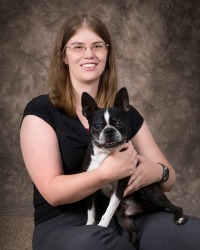Laura Bryan, DVM

Dr. Laura K. Bryan
Dr. Laura K. Bryan is the 2014 AKC Canine Health Foundation Clinician-Scientist Fellow from Texas A&M AgriLife Research.
Dr. Bryan completed her Doctorate in Veterinary Medicine at University of Georgia in 2011. Her research passion is infectious disease with a focus on reducing skin disease in dogs, particularly those infections associated with Staphylococcus. Staphylococcus pseudointermedius is found on the skin of both healthy dogs and dogs with skin disease, and the challenge for Dr. Bryan is to understand how and why some dogs develop skin infections and some do not. Part of solving this puzzle is to understand how the genetic makeup of different breeds results in susceptibility or resistance to Staph skin infections. Dr. Bryan is currently completing a PhD and residency program in Anatomic Pathology at Texas A&M College of Veterinary Medicine & Biomedical Sciences. Anatomic Pathology is a specialty that enables clinicians to diagnosis disease based on the gross, microscopic, chemical, immunologic and molecular examination of organs and tissues. This critical field of study supports all other specialties in veterinary medicine.
Fellowship Research Project
Dr. Bryan’s research will focus on exfoliative toxins in Staphylococcus pseudintermedius pathogenesis.
Bacterial skin infection, or pyoderma, is a common condition in dogs and is one of the main reasons that owners seek veterinary care for their animals. Staphylococcus pseudintermedius is the leading cause of canine pyoderma and secondary infections related to atopic dermatitis and surgery. Improved understanding of S. pseudintermedius pathogenesis may improve our recognition of isolates that have a high propensity to cause disease in dogs. One factor that has not been fully explored is the role of exfoliative toxin (ET) in the pathogenicity of S. pseudintermedius. Staphylococcus species utilize powerful ETs that breakdown the connections between cells in the superficial skin layers and allow bacteria to migrate and establish infection deep within the dermis and subcutis. We will analyze ET gene carriage in our collection of 620 S. pseudintermedius isolates collected from numerous breeds using PCR techniques and will use immunohistochemical detection to determine if S. pseudintermedius ETs are present in patient skin biopsies from clinically normal animals and those with skin disease. It is our ultimate goal to develop antibodies to purified ET protein that could be used for future development of diagnostic tools and vaccines.
Learn more about the AKC Canine Health Foundation Clinician-Scientist Fellowship Program and Adopt a Researcher.
Help Future Generations of Dogs
Participate in canine health research by providing samples or by enrolling in a clinical trial. Samples are needed from healthy dogs and dogs affected by specific diseases.



